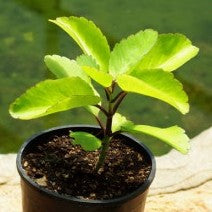
Bryophyllum Pinnatum - Panfuti
Bryophyllum Pinnatum, also known as the Air Plant, Life Plant, Miracle Leaf, and Goethe Plant is a succulent plant native to Madagascar, which is a popular houseplant and has become naturalized in temperate regions of Asia, the Pacific and Caribbean. It is distinctive for the profusion of miniature plantlets that form on the margins of its leaves, a trait it has in common with the other members of the genus Bryophyllum.
Panfuti is an erect, more or less branched, smooth, succulent herb, 0.4 to 1.4 meters in height. Leaves are simple or pinnately compound, with the leaflets elliptic, usually about 10 centimeters long, thick, succulent, and scalloped margins. Plantlets grow along the notches of the leaf margins which can develop while still attached to the plant or when detached, a fascinating characteristic that earns its name. Flowers are cylindric, and pendulous in a large, terminal panicle. Calyx is tubular, cylindric, inflated, brownish or purplish, 3.5 to 4 centimeters long. Corolla is tubular, about 5 centimeters long, inflated at the base, and then constricted, the exserted parts being reddish or purplish and the lobes tapering to a point. Fruit is a follicle with many seeds.
Distribution
- In open settled areas, thickets, dry second-growth forests, sometimes planted, and locally abundant.
- Prehistoric introduction from tropical Asia or Malaya.
- Also cultivated, flowering from December to March.Â
- Pantropic.
ConstituentsÂ
- Phytochemical screenings have yielded alkaloids, triterpenes, glycosides, flavonoids, steroids, butadienolides, lipids, and organic acids.
- Yields arachidic acid, astragalin, behenic acid, beta amyrin, benzenoids, bersaldegenin, beta-sitosterol, bryophollenone, bryophollone, bryophyllin, caffeic acid, ferulic acid, quercetin, steroids, and taraxerol.
- Phytochemical evaluation of leaf extract yielded bryophyllum A, B and C, a potent cytotoxic bufadienolide orthoacetate.
- Bufadienolide has been reported to be poisonous with digitalis-toxicity type cardiac effects (slowing of heart rate, heart blocks and potentially fatal ventricular arrhythmias.
- Bryophillin A, a bufadienolide compound, has shown anti-tumor promoting activity.
- Leaves yield malic acid.
- Fractionation of an EtOAc extract yielded seven kaempferol rhamnosides: kaempferol 3-O-α-L-(2-acetyl)rhamnopyranoside-7-O-α-L-rhamnopyranoside, kaempferol 3-O-α-L-(3-acetyl)rhamnopyranoside-7-O-α-L-rhamnopyranoside, kaempferol 3-O-α-L-(4-acetyl)rhamnopyranoside-7-O-α-L-rhamnopyranoside, kaempferol 3-O-α-D- glucopyranoside-7-O-α-L-rhamnopyranoside, afzelin, and α-rhamnoisorobin. (19)
Properties
- Leaves considered astringent, antiseptic, hemostatic, refrigerant, emollient, counterirritant, mucilaginous, vulnerary, depurative, anti-inflammatory, disinfectant, and tonic.
- Pharmacologic studies have showed pharmacologic properties: immunomodulatory, CNS depressant, analgesic, anti-inflammatory, anti-allergic, antianaphylactic, antileishmanial, antitumorous, antiulcer, antibacterial, antifungal, antiviral, febrifuge, gastroprotective, immunosuppressive, insecticidal, sedative, muscle relaxant.
Parts utilized
- Entire plant. May be collected year round; preferably used fresh.
Uses
- Leaves used as astringent, antiseptic, and counterirritant against poisonous insect bites.
- Pounded fresh material is applied as a poultice for a variety of conditions: Sprains, eczema, infections, burns, carbuncle and erysipelas.Â
- Leaves, made pliable by hold over fire, are applied to wounds, bruises, boils; also, used as poultice or power in bad ulcers.
- Juice is mixed with lard and used for diarrhea, dysentery, cholera, and phthisis.
- Pounded leaves are applied as poultices to the soles of the feet to stop hemorrhages.
- Leaves are used as topicals in dislocation, ecchymoses, callosities.
- Leaves, pounded and mixed with salt, used as plaster and applied to stomach to relieve enuresis
- For boils, the whole leaf is pressed by hand, to and fro, until it becomes moist with the leaf extract. A small opening is made in the middle of the leaf which is then placed on the boil with hole over the pointing of the abscess.
- For asthma, leaves of leaves places in hot water for 15 minutes, then juice squeezed out of the leaves, and drunk.Â
- Juice of leaves used in bilious diarrhea and lithiasis.Â
- In Ayurveda, useful in vitiated conditions of vata and pitta, cuts, wounds, HEMORRHOIDS, menorrhagia, boils, sloughing ulcers, burns and scalds, diarrhea, dysentery, headaches, vomiting, bronchitis.Â
- In Puerto Rico, leaf juice used as diuretic.
- Leaves are rubbed or tied on the head for headaches.
- Leaf decoction usually taken to lower blood pressure.Â
- Leaf juice used for earache and ophthalmia.
- In Sierre Leon, cough medicine is made from the roots.Â
- In Brazil leaves, heated over fire and mixed with OIL, are used as emollient and refrigerant for facial swelling associated with neuralgia or tooth trouble. Also, used for asthma and bronchitis.
- In Jamaica, leaves used for coughs and colds. Sometimes, it is mixed with salt or honey, for headaches, colds, bronchial affections, and hypertension. Heated leaves used for swellings and abscesses.
- In Africa, used for earaches, EYE PROBLEMS, and as diuretic.
- In China used for rheumatoid arthritis, bruises, burns and ulcers.
- In Nigeria, plant is considered sedative, wound-healing, diuretic, anti-inflammatory, and cough suppressant. Leaf juice used to treat boils and skin ulcers. Plant used for intestinal parasites, bronchitis, pneumonia.Â
FAQs:
What is the Return Policy?
This product is Not Returnable. It may be replaced or refunded in case of damage or defective condition on a case to case basis.
How to cancel my order?
Cancellation for Live Plants is allowed before the dispatched. You can request cancellation through Your Orders page or by contacting customer service within that time.
What if i received damage product?
If a product is received in a damaged or defective condition, you need to contact the customer service within 1 days of delivery. Free of cost replacement or refund claim is available to you.


